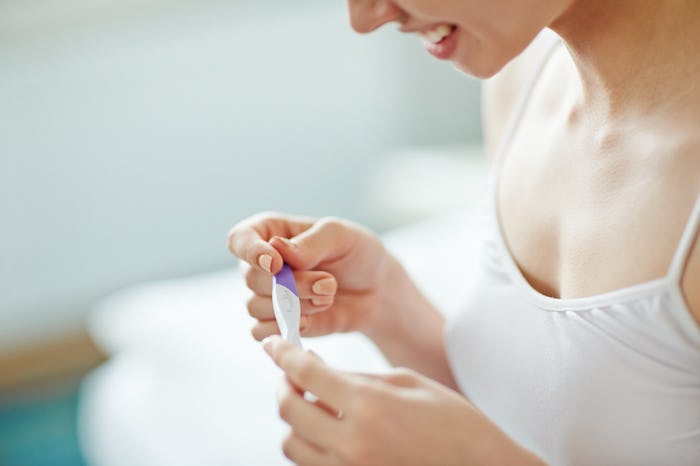Life

Here's Which Pregnancy Test Is Most Accurate
When your period is late, it's totally understandable to feel anxious. Whether you've been trying to conceive or not, you just want to find out if you're pregnant. So it makes sense to ask yourself — what is the most accurate pregnancy test? After all, you probably want to stop wondering and to start planning ahead. But the good news is that you have numerous options available to you and that you'll be able to get your results sooner rather than later.
There are two main types of pregnancy tests — a blood test and a urine test. Both tests work by detecting a hormone called human chorionic gonadotropin (hCG), which your placenta produces after the embryo attaches to the uterus, according to the American Pregnancy Association. Out of these two testing options, a blood test will cost more and must take place at a doctor's office, but it will be more accurate and can be administered sooner (around seven to 12 days from possible conception). "Urine tests are getting more accurate and detecting pregnancies sooner, but they've yet to achieve the accuracy of a blood test," Dr. Neil Foster, an OB-GYN based out of Leesburg, Virginia, tells Romper.
Due to the cost and inconvenience of a blood test, however, many women choose to take a urine test at home. But choosing a home pregnancy test can be overwhelming all by itself. My local Target, for instance, offers nearly a dozen options, from brand names to generic, from digital tests to the good ol' plus or minus. With so many tests to choose from, which one is the most accurate? A 2011 study from the National Center for Biotechnology Information compared six over-the-counter pregnancy tests (both manual and digital) and found the First Response brand to be the most precise compared to EPT and ClearBlue. The First Response manual and digital tests detected 97 percent of 120 pregnancies on the first day of a missed period. Comparatively, the EPT manual and digital tests detected 54 percent and 67 percent of pregnancies, while the ClearBlue manual and digital tests detected 64 percent and 54 percent of pregnancies.
Before you pick up your pregnancy tests, keep in mind that timing plays a big part in the accuracy. You might get a false negative if you take a urine test too early after your missed period. For the best results, the Mayo Clinic suggested waiting a week after your missed period and taking the test right after you wake up in the morning (that's when your urine is at its most concentrated). And if you can't wait that long, make a doctor's appointment to take a blood test.
When you suspect that you may be pregnant, you might feel excited or scared or overwhelmed — maybe all at once. But thanks to advances in medical technology, you won't have to wait too long before you get your results, whether you take a pregnancy test at the doctor's office or within the comforts of your home.